
Cookware and bakeware is food preparation equipment, such as cooking pots, pans, baking sheets etc. used in kitchens. Cookware is used on a stove or range cooktop, while bakeware is used in an oven. Some utensils are considered both cookware and bakeware.
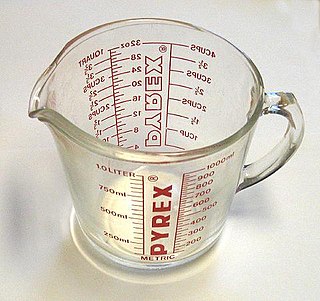
Pyrex is a brand introduced by Corning Inc. in 1915 for a line of clear, low-thermal-expansion borosilicate glass used for laboratory glassware and kitchenware. It was later expanded to include ware products made of soda-lime glass and other materials.
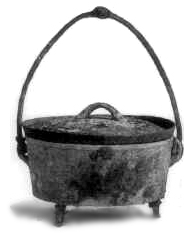
A Dutch oven is a thick-walled cooking pot with a tight-fitting lid. Dutch ovens are usually made of seasoned cast iron; however, some Dutch ovens are instead made of cast aluminium, or ceramic. Some metal varieties are enameled rather than being seasoned, and these are sometimes called French ovens. Dutch ovens have been used as cooking vessels for hundreds of years. They are often called casserole dishes in some English-speaking countries other than the United States, and cocottes in French. They are similar to both the Japanese tetsunabe and the sač, a traditional Balkan cast-iron oven, and are related to the South African potjie, the Australian Bedourie oven and Spanish cazuela.
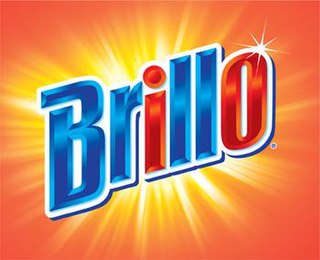
Brillo is a trade name for a scouring pad, used for cleaning dishes, and made from steel wool impregnated with soap. The concept was patented in 1913, at a time when aluminium pots and pans were replacing cast iron in the kitchen; the new cookware blackened easily. The company's website states the name Brillo is from the Latin word for "bright", although no such word exists in Latin. In Spanish the word brillo means the noun "shine"; however, German, Italian, French, and English do have words for "shine" or "bright" beginning with brill- deriving from Latin words for beryl.

Corning Ware, also written CorningWare, was originally a brand name for a unique glass-ceramic (Pyroceram) cookware resistant to thermal shock. It was first introduced in 1958 by Corning Glass Works in the United States. The brand was later spun off with the sale of the Corning Consumer Products Company subsidiary. Glass-ceramic based Corning Ware can be taken from the refrigerator or freezer and used directly on the stovetop, in an oven or microwave, under a broiler, for table/serving use, and when ready for cleaning put directly into a dishwasher. CorningWare is sold worldwide, and it is popular in North America, Asia, and Australia.

Le Creuset is a premium French-Belgian cookware manufacturer best known for its colourfully-enameled cast-iron cookware "French ovens", also known as "cocottes" or "coquelles" and "sauce pans" or "casseroles". The company also makes many other types of cookware and bakeware, from fondue-sets to tagines.

Heavy-duty cookware made of cast iron is valued for its heat retention, durability, ability to maintain high temperatures for longer time duration, and non-stick cooking when properly seasoned. Seasoning is also used to protect bare cast iron from rust. Types of cast iron cookware include frying pans, dutch ovens, griddles, waffle irons, flattop grills, panini presses, crepe makers, deep fryers, tetsubin, woks, potjies, and karahi.

Lodge Manufacturing Company is an American manufacturer of cast iron cookware based in South Pittsburg, Tennessee. Founded in 1896 by Joseph Lodge, Lodge Manufacturing is one of America's oldest cookware companies in continuous operation. It is still owned and managed by the descendants of the Lodge family. Most cast iron sold by Lodge is produced in its foundry in South Pittsburg, which has been in operation since the company was founded.
Lagostina is an Italian manufacturer of cookware, cutlery and other kitchenware. They are also an important manufacturer of pressure cookers. Lagostina was founded in 1901 in Omegna, Province of Verbania, Italy, as a family business initially focusing on stainless steel flatware.

The Descoware brand of porcelain-coated cast iron cookware was created by David E. Sanford of the D.E. Sanford Company, later known as Desco Corporation. Sanford purchased the manufacturing rights to the Bruxelles Ware process from General Housewares Corporation in the 1940s, giving him the right to sell the products in the United States.
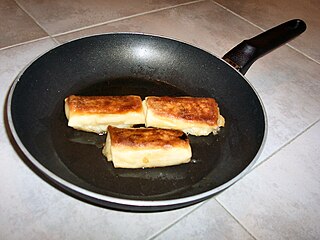
A non-stick surface is a surface engineered to reduce the ability of other materials to stick to it. Non-stick cookware is a common application, where the non-stick coating allows food to brown without sticking to the pan. Non-stick is often used to refer to surfaces coated with polytetrafluoroethylene (PTFE), a well-known brand of which is Teflon. In the twenty-first century, other coatings have been marketed as non-stick, such as anodized aluminium, silica, enameled cast iron, and seasoned cookware.
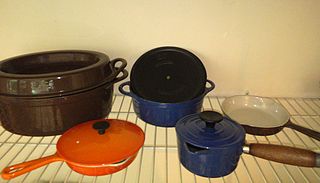
Cousances was a French cookware manufacturer, known for enameled cast iron pans. The Cousances foundry in northeastern France began making cast iron pans in 1553; four centuries later, by then an international company, it was acquired by Le Creuset in 1957. Cookware under the Cousances brand continued to be manufactured by Le Creuset into the early 1980s.

Seasoning or curing is the process of coating the surface of cookware with a bioplastic formed from heated fat or oil in order to produce a heat, corrosion, and stick resistant hard coating. It is required for cast-iron cookware and carbon steel, which otherwise rust rapidly in use, but is also used for many other types of cookware, as it helps prevent food sticking.

Griswold Manufacturing was an American manufacturer of cast iron kitchen products founded in Erie, Pennsylvania, in business from 1865 through 1957. For many years the company had a world-wide reputation for high-quality cast-iron cookware. Today, Griswold pieces are collector's items.

Staub is a premium French enameled cast iron cookware and bakeware manufacturer that was originally headquartered in Turckheim, Alsace, France. The first piece, a cocotte or coquelle, was designed by Francis Staub in 1974 in a dormant artillery factory. Pieces are manufactured with cast iron covered with double-glazed enamel. The enamel coating makes the cookware rustproof, and easy to clean. Staub's cocottes have nubs on the interior of the lids, which enables condensation to collect and drip down to baste foods uniformly as they are cooking.

The Wagner Manufacturing Company was a family-owned manufacturer of cast iron and aluminum products based in Sidney, Ohio, US. It made products for domestic use such as frying pans, casseroles, kettles and baking trays, and also made metal products other than cookware. Wagner was active between 1891 and 1952, and at one time dominated the cookware market, selling in Europe and the US. The purchasers of the company in 1952 continued the brand, and Wagner products are still manufactured today. The original items are prized by collectors.

Zwilling J. A. Henckels AG is a German knife-maker based in Solingen, Germany. It is one of the largest and oldest manufacturers of kitchen knives for domestic and professional use, having been founded in June 1731 by Peter Henckels. The brand's namesake was Johann Abraham Henckels (1771–1850), who renamed the brand after himself under his leadership. J.A. Henckels is one of the leading manufacturers of chef's knives.















